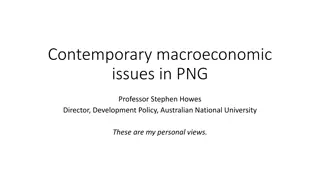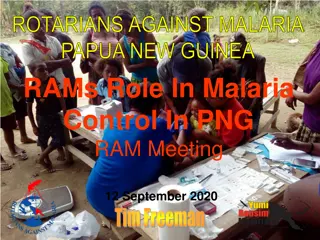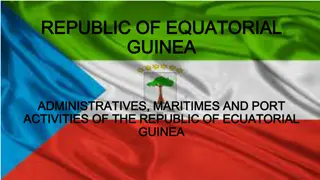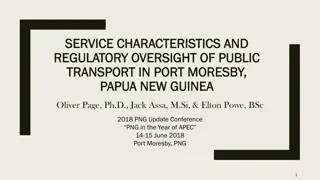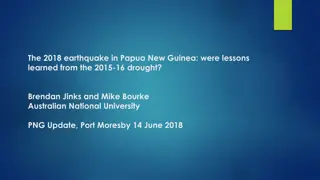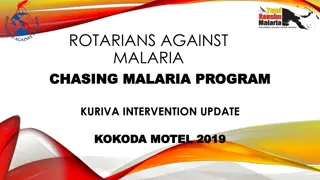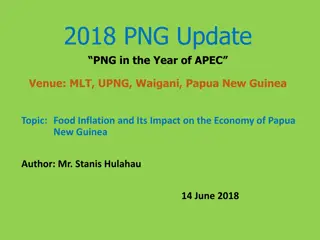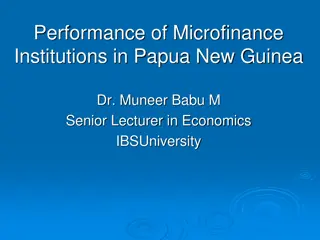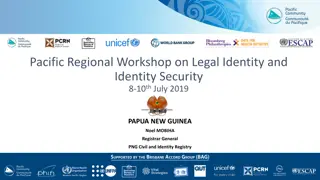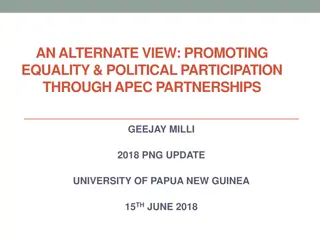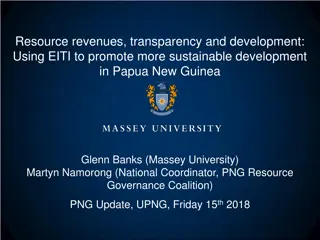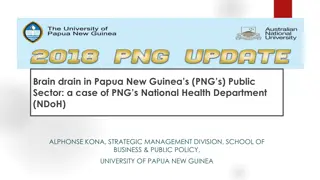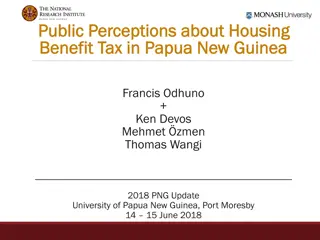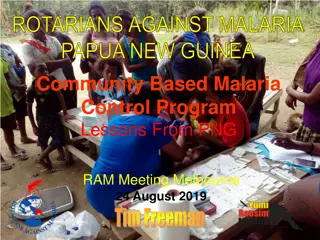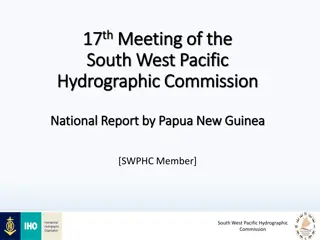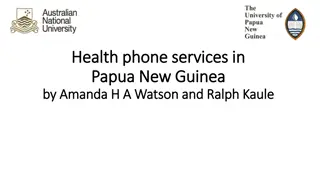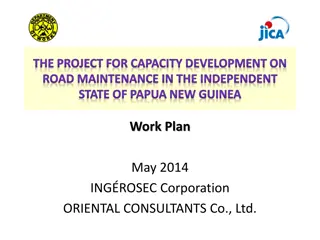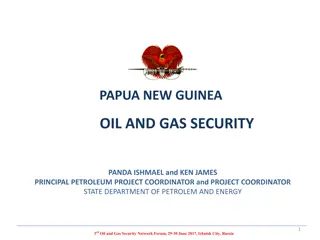Energy Sector Development in Papua New Guinea: Progress and Initiatives
Papua New Guinea faces challenges in energy sector development due to its diverse geography and vast number of local languages. Efforts are being made to increase renewable energy sources, improve energy efficiency, and adopt international standards. The National Energy Authority plays a key role in regulating the sector and implementing various initiatives to achieve sustainable energy goals.
Download Presentation

Please find below an Image/Link to download the presentation.
The content on the website is provided AS IS for your information and personal use only. It may not be sold, licensed, or shared on other websites without obtaining consent from the author.If you encounter any issues during the download, it is possible that the publisher has removed the file from their server.
You are allowed to download the files provided on this website for personal or commercial use, subject to the condition that they are used lawfully. All files are the property of their respective owners.
The content on the website is provided AS IS for your information and personal use only. It may not be sold, licensed, or shared on other websites without obtaining consent from the author.
E N D
Presentation Transcript
Pacific Regional Capacity Building Energy Audit & Energy Management Template for Country Presentation 27thFeb 3rdMar 2023 Presented by Russell Hangatt Economic Regulation National Energy Authority
Geography of Papua New Guinea (PNG) 179,000 square kilometres of landmass. Most land is mountainous as one of the hinderance to government service delivery (infrastructure, etc..). 70% is customary and 30% government owned land. More than 800 local languages. 64% of electricity comes from fossil fuel (diesel
PNG Energy Sector Ministry for Petroleum and Energy Energy Ministry for Petroleum and National Industrial Standard & Technological Institute (NISIT) National Energy Authority (2022) (Regulator) Department of Petroleum Department of Petroleum Electrical Contractors (Enforcement of Installation and Wiring Rules) and Appliances Standards Independent Power Producers and Suppliers
PNG Strategic Plan 2010 2030 (Section 4.11. on Energy Development). Introduction / Policies / Legislations / Regulations on Energy Efficiency, Energy Conservation and Energy Management (i) 20% non-renewable and 80% renewable by 2030. PNG Vision 2050 (i) 100% renewable energy by 2050. National Energy Policy National Roll-Out Plan National Energy Authority 2021 (established NEA to meet policy targets). Electricity Industry (Amendment) 2002. In Draft: Sub- policies (Solar, Geothemal, Hydrogen, Biomas). Off-Grid Regulation for Small Power Systems current in the progress of approval. Four Technical Regulations
Review of 4 Regulations (Electricity Industry EI) (Electrical and Electrical Contractors) Regulation 2006, EI (Services and Installations) Regulation 2006, EI(Electric Appliances) regulation 2006 and EI (General) Regulation 2006. Adopting standards on energy efficiency from Australia/NZ. NEA has issued licences for electricians and electrical contractors. More than 60 licences have been issues in the last 3 months. These electricians will use the Australian/NZ Wiring Standards 2018 including other adopted energy efficiency standards. Solar Solar Roof Top Project been implemented. Konos Solar System installed by Middle New Ireland. Progress & Achievements for the Last 3 Years (on EE & EA Initiatives)
2021 - Awareness and inspections to mostly the independent power producers, provincial governments. Awareness / Productivity & Similar Initiatives 2022 - Plan to extend awareness program on roles of NEA and energy/electricity policies with the support of development partners (USAID-PNG Electrification Programme, AUSID Economic & Insfrasfructure Programme (ESIP), NZ and JICA supporting in our outreach programme. Awareness on proposed Off-Grid Regulation for small power systems.
Lack of capacity development (Procurement, Tariff setting, economic and technical regulatory trainings, etc..). Skills Gap Analysis undertaken by USAID and trainings are currently undertaken. Challenges & Opportunities Encountered No sub-sector policies and these are priorities for 2023. Regulations, codes, rules and guidelines. Adoption of Australian/NZ wiring standards from PNG Standard body and former technical regulator (PNG Power Limited). Other standards are yet Advanced Search Results APAC -SAI Global Infostore to be adopted through NISIT. Most standards will be adopted from Advanced Search Results APAC -SAI Global Infostore Opportunities (training and development) are currently been provided by USAID, AUSAID, World Bank, JICA, IRENA, OPERA.
Development our Corporate Plan 2022 2027. Building the foundation of NEA Setting up energy policies, recruitment of technical officers, seeking funding from development partners for project (e.g. National Energy Access Project) funded by World Bank. Plans for 2023 - 2030 Supporting investors (Fortesque, etc ) using through Investors Guideline developed by USAID. Participating in renewable energy conferences and workshops. Development of Down-stream legislation.
Recommendations & Way Forward Effective coordination and coorperation between Government, development partners including private sectors to meet 2030 and 2050 targets. Established policies, legislations, regulations, codes, rules and guidelines.



